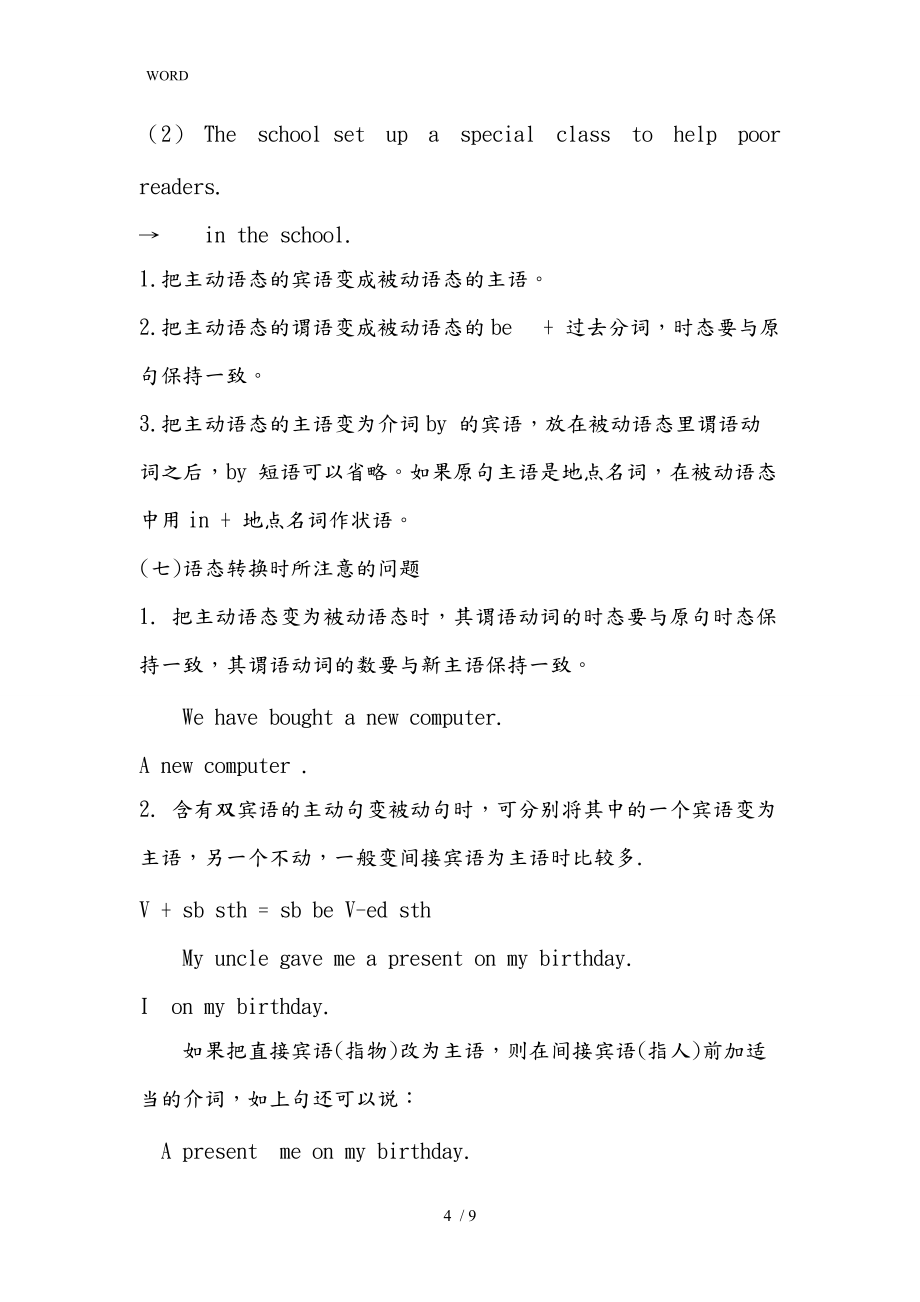




版權說明:本文檔由用戶提供并上傳,收益歸屬內容提供方,若內容存在侵權,請進行舉報或認領
文檔簡介
1、 WORD 初中被動語態語法講解(一) 語 態 分 類英語動詞有兩種語態.,主動語態和被動語態。主動語態表示主語是動作的執行者,被動語態表示主語是動作的承受者。如: They will build a new bridge over the river. ( )A new bridge will be built over the river. ( )英語用:助動詞be + 與物動詞的過去分詞構成。(二) 被動語態的時態、人稱和數的變化 &#
2、160;主要體現在be的變化上,動詞的過去分詞不變。列表如下:一般現在時: + done一般過去時: + done一般將來時: + done過去將來時: + done現在進行時:am / is / are + being + done過去進行時:was / were + being + done現在完成時:+ done過去完成時:had + been + done將來完成時:shall / will + have been + done過去將來完成時:should / would + have been + done 注被動語態沒有將來進行時和過去將
3、來進行時。(三)常見的八種時態中的被動語態1. 一般現在時:(1)People grow rice in the south of the country.Rice in the south of the country.(2)The school doesn't allow us to enter the chemistry lab without a teacher.We enter the chemistry lab without a teacher.2. 一般過去時:(1)The students didn't forget his
4、lessons easily.His lessons 3. 一般將來時:(1)They will send cars abroad by sea.Cars .(2)They will give plenty of jobs to school-leavers.Plenty of jobs .4.現在完成時:(1)Someone has told me the sports meeting might be put off.I the sports meeting might be put off.(2)He has bro
5、ught his book here.His book here.(四) 含有情態動詞的被動語態: 含有情態動詞的被動語態是由“情態動詞+ be+ 與物動詞的過去分詞”構成。 (1)You must hand in your compositions after class.Your compositions after class.(2)He can write a great many letters with the
6、computer.A great many letters him.(五) 被 動 語 態 的 使 用1.當不知道或沒有必要指出動作的執行者時,常用被動語態,這時往往不用by 短語。 “Mr. White, the cup (break) after class. ”2.突出或強調動作的承受者,如果需要說出動作的執行者,用by 短語。 These records were made by John Denver.The cup was broken
7、by Paul.3.當漢語句子的主語既不是動作的執行者,也不是動作的承受者時,這時常用in + 名詞作狀語,而代替 by 短語。 These cars were made in China.be made of、be made from(六)主動語態變被動語態的方法(1) My aunt invited me to her dinner party.主語 謂語 賓語
8、;I to her dinner party.主語 謂語 賓語(2) The school set up a special class to help poor readers. in the school.1.把主動語態的賓語變成被動語態的主語。2.把主動語態的謂語變成被動語態的be + 過去分詞,時態要與原句保持一致。3.把主動語態的主語變為介詞by&
9、#160;的賓語,放在被動語態里謂語動詞之后,by 短語可以省略。如果原句主語是地點名詞,在被動語態中用in + 地點名詞作狀語。(七)語態轉換時所注意的問題1. 把主動語態變為被動語態時,其謂語動詞的時態要與原句時態保持一致,其謂語動詞的數要與新主語保持一致。 We have bought a new computer.A new computer . 2. 含有雙賓語的主動句變被動句時,可分別將其中的一個賓語變為主語,另一個不動,一般變間接賓語為主語時比較多.V + sb sth
10、= sb be V-ed sth My uncle gave me a present on my birthday.I on my birthday. 如果把直接賓語(指物)改為主語,則在間接賓語(指人)前加適當的介詞,如上句還可以說: A present me on my birthday.注意:1.一般在下列動詞后,常在間接賓語前用介詞 to,如: bring, give, hand, lend, offe
11、r, pass, pay, promise, sell, show, take, teach, tell 等。 (1) The book the class. (show)(2) My bike her. (lend) 2.一般在下列動詞后,間接賓語前用介詞 for, 如: build, buy, cook, cut, choose, do, fetch, find, fix, get, k
12、eep, make, order, paint, play, sing 等。 (1) A new skirt me. (make)(2) The meat us. (cook)(3) Some country music us. (play)3. 由動詞+ 介詞或副詞構成的短語動詞,要把它們作為整體看,即把它們看成一個與物動詞,介詞或副詞不可拆開或漏掉。這類動詞有:不與物動詞+ 介詞,如: agree to, ask for, laugh
13、at, operated on, listen to, look after, think of, talk about 等。 The patient is being operated on.The problem is solved. It needn't be talked about.與物動詞+ 副詞:如:bring about, carry out, find out, give up, hand in, make out, pass on, point out, put away, put off, think over, turn
14、 down, work out, turn out 等。 His request was turned down.The sports meet will be put off because of the bad weather4. 帶復合賓語(賓語+ 賓補)的動詞改為被動語態時,一般把主動結構中的賓語改為主語,而賓語補足語保留在謂語動詞后面。如: (1) We always keep the classroom clean.The classroom .(2) She told us to f
15、ollow her instructions.We .注意:在see, watch, hear, notice, listen to, look at, make, feel等動詞后作賓語補足語的動詞不定式都不帶 to,但改成被動語態后都帶to,這時不定式為主語補足語,也就是說不定式作主語補足語不存在省略to 的問題。 We often hear him play the guitar.He play the guitar.5. 當主動句的主語是nobody, no one等含有否定意義的不定代詞時,被動句中將其變為anybod
16、y,作by的賓語,并將謂語動詞變為否定的被動語態。如: Nobody can answer this question.The question can be answered by nobody. (×)The question .6. 當否定句中的賓語是anything, anybody, anyone等不定代詞時,在被動句中應將其分別變為nothing, nobody, no one作主語,并將謂語動詞變為肯定的被動語態。如: They ha
17、ven't done anything to make the river clean.Anything hasn't been done to make the river clean. (×).7. 以who為主語開頭的疑問句,變被動時,用by whom放在句首: Who wrote the story?Who was the story written? (×)?8. 有些動詞既是與物又是不與物,當它們和
18、well, badly, easily等副詞連用時,表示主語在品質或性能,是不與物動詞,用主動表示被動,這時不用被動語態,常見的有:write, read, clean, sell, wash, cook 等。如: (1)The cloth washes easily. 這布很好洗。(2)The new product sells well. 這新產品很暢銷。對比:The books sell well. (主動句)The books were sold out. (被動句)The meat didnt cook we
19、ll. (主動句)The meat was cooked for a long time. (被動句)9. 下列情況主動句不能改為被動句:第一,感官系動詞一般用主動形式表示被動意義,如:feel,look, seem, taste, sound, remain等。 (1) Do you like the material? Yes, it (feel) very soft.(2)The food (taste) delicious.(3)The pop music (sound) beautiful.第二,謂語是與物動詞lea
20、ve, enter, reach, suit, have, benefit, lack, own等,不用被動語態。 He entered the room and got his book.誤:The room was entered and his book was got.She had her hand burned.誤:Her hand was had burned.第三,一些不與物動詞短語沒有被動語態,如:take place, break out, belong to, lose heart, consist of, add up to等。如: &#
21、160;The fire broke out in the capital building.誤:The fire was broke out in the capital building.第四,不與物動詞沒有被動語態,如:rise, happen, succeed, remain, lie等。 When we got to the top of the mountain, the sun had already risen.誤:The sun had already been risen.After the earthquake, few houses remained.誤:After the earthquake, few houses were remained.第五,賓語是反身代詞,相互代詞,同源賓語,不定式,v-ing形式與抽象名詞等,不能變為被動句子的主語,如: I taught myself English.誤:Myself was taught English.We love each other.誤:Ea
溫馨提示
- 1. 本站所有資源如無特殊說明,都需要本地電腦安裝OFFICE2007和PDF閱讀器。圖紙軟件為CAD,CAXA,PROE,UG,SolidWorks等.壓縮文件請下載最新的WinRAR軟件解壓。
- 2. 本站的文檔不包含任何第三方提供的附件圖紙等,如果需要附件,請聯系上傳者。文件的所有權益歸上傳用戶所有。
- 3. 本站RAR壓縮包中若帶圖紙,網頁內容里面會有圖紙預覽,若沒有圖紙預覽就沒有圖紙。
- 4. 未經權益所有人同意不得將文件中的內容挪作商業或盈利用途。
- 5. 人人文庫網僅提供信息存儲空間,僅對用戶上傳內容的表現方式做保護處理,對用戶上傳分享的文檔內容本身不做任何修改或編輯,并不能對任何下載內容負責。
- 6. 下載文件中如有侵權或不適當內容,請與我們聯系,我們立即糾正。
- 7. 本站不保證下載資源的準確性、安全性和完整性, 同時也不承擔用戶因使用這些下載資源對自己和他人造成任何形式的傷害或損失。
最新文檔
- 購銷合同范文
- 建筑材料采購合同協議書
- 勞動合同解除談話筆錄1
- 企業云計算資源使用合作協議
- 數字化合作框架下的遠程工作協作合同
- 配電網升級改造合同
- 環保工程服務合同:全面解決方案
- 合同生命周期管理:物業財務關鍵制度
- 圖書館目視化管理
- 拆除工程中的文物保護與遷移策略考核試卷
- 2023年5月7日內蒙古事業單位聯考職業能力傾向測驗A類真題答案解析
- 管道溝槽開挖施工方案
- 《城市數字孿生標準化白皮書(2022版)》
- 《入職心得分享》課件
- 中職班級工作
- 直流輸電技術培訓課件
- 2024.8.1十七個崗位安全操作規程手冊(值得借鑒)
- 《工業園區物業服務》課件
- 危險貨物運輸企業安全風險辨識分級管控
- 【語文課件】地動儀課件
- 非營利組織中層管理人員薪酬管理政策

評論
0/150
提交評論